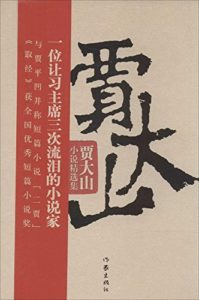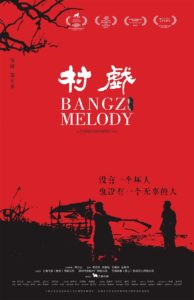Bangzi Melody
村戏
China, 2017, b&w/colour, 2.35:1, 99 mins.
Director: Zheng Dasheng 郑大圣.
Rating: 6/10.
Ironic, post-CR village tale has plenty of interesting ideas but lacks clarity and feels undeveloped.
A village in Hebei province, northern China, the early 1980s, Dec. In the run-up to Chinese New Year in January a remote commune learns by accident that land reform is on its way when Wang (Wang Chunming), the local Party representative, announces that the villagers must stage a classical (not revolutionary) opera for visiting cadres and that the success of the endeavour will influence their future prosperity. Wang asks those who can sing to register – especially young people, who can learn all about classical opera from Lu Laohe (Liang Chunzhu), a local bigwig and successful peanut-oil presser. During the announcement, chaos breaks out as Wang Kuisheng (Li Zhibing), who went mad 10 years ago in the middle of the Cultural Revolution and has since lived in a shack outside the village, chases Yang Zhigang (Chen Chen) with a bucket of night soil after the latter’s dog ate some of his peanuts. Much to Yang Zhigang’s annoyance, Wang Kuisheng is still the legal owner of Jiumuban 九亩半, a fertile, well-irrigated patch of land that is just over half a hectare. Wang Kuisheng is always accusing the locals of stealing the peanuts grown on it. After everyone calms down, Party rep Wang says that those performing in the opera will get extra work points, and he urges Lu Laohe, the village’s resident opera specialist, to stage it as soon as possible, before 5 Jan. He suggests Beating the Princess 打金妓, with Wang Kuisheng’s son, Wang Shuman (Zhang Yahao), as Prince Guo and Lu Laohe’s daughter, Lu Xiaofen (Zhang Huijuan), as the Princess. (The two youngsters also happen to be sweet on each other.) Instead, Lu Laohe does a deal with Yang Zhigang to cast him as Prince Guo and the two of them to jointly take over Jiumuban in the forthcoming land reform that will get rid of collective farming: Yang Zhigang will work the land and Lu Laohe will store the produce. Lu Laohe’s decision surprises his daughter and disappoints Wang Shuman, who protests before the villagers but is overruled by Lu Laohe and Party rep Wang. Wang Shuman threatens to leave the village and Lu Xiaofen tries to dissuade him. Still convinced that the villagers are stealing his peanuts, the mad Wang Kuisheng creates another uproar and is chased away; only his son stands up to him when he brandishes his rifle. Later, Wang Kuisheng returns home for the first time in 10 years and is cleaned up by his wife (Lv Aihua). Wang Shuman used to be ashamed of his mad father but now has to come to terms with him being around. Realising Yang Zhigang is not up to the role of Prince Guo, Lu Laohe relents and agrees to Wang Shuman taking the part; but he tells Party rep Wang that, in the forthcoming land reform, he’d like Jiumuban. The big question for Party rep Wang is whether or not to officially recommend that Wang Kuisheng – who was once a local hero before going mad during the Cultural Revolution – should be incarcerated in a mental asylum.
REVIEW
An ironic village yarn set in the early 1980s, as collective farming was replaced by individual ownership in the Mainland, Bangzi Melody 村戏 comes laden with metaphors on how values can flip-flop at a moment’s notice and how people adapt to take advantage of them. Shot in widescreen b&w, with tinted inserts, and performed with gusto by a non-pro cast, it’s accessibly arty in style but let down by an annoying lack of clarity in the script and any real development of its characters and material. Made by production giant Shanghai Film Group, it took just under RMB1 million on release, a modest amount even by the standards of such specialised product.
Director Zheng Dasheng 郑大圣, then in his late 40s, was not some recently graduated film student burning to make a low-budget work of art. The son of director Huang Shuqin 黄蜀芹 – best known for her drama centred on an opera actress, Woman Demon Human 人•鬼•情 (1987) – Zheng was born in Shanghai during the heat of the Cultural Revolution but grew up with his grandparents in Tianjin, northern China, a region he claims to identify with more than Shanghai. After graduating in direction from Shanghai Theatre Academy in 1990, and a spell in the US, he returned home and started directing TV dramas, TV films (A Tao 阿桃, 2000; The Death of Wang Bo 王勃之死, 2000) and finally theatrical features (Useless Man 天津闲人, 2012; Falling City 危城之恋, 2012). In its dusty, arid style, Bangzi is quite a departure for Zheng from his previous works, even though his A Tao had centred on a young teenage girl in the countryside following the CR.
 Bangzi is set in the early 1980s, about half-a-dozen years after the end of the CR but when minds were still fresh from the period and change was only gradually starting to take place. The script by Li Baoluo 李保罗 was adapted from three short stories – 花生 (“Peanuts”), 老路 (“Old Lu”) and 村戏 (“Village Show”) – in the 2014 collection 贾大山小说精选集 (see cover, left) by Hebei writer Jia Dashan 贾大山 (1943-97). On the surface it’s a simple tale about the villagers in a remote commune trying to put on a performance of a classical opera to impress visiting cadres during Chinese New Year: the classics are back, revolutionary operas are out, and communes are being replaced by personal ownership of land, so the village’s Party rep urges the locals to think of their future by putting on a good show and gaining extra work points.
Bangzi is set in the early 1980s, about half-a-dozen years after the end of the CR but when minds were still fresh from the period and change was only gradually starting to take place. The script by Li Baoluo 李保罗 was adapted from three short stories – 花生 (“Peanuts”), 老路 (“Old Lu”) and 村戏 (“Village Show”) – in the 2014 collection 贾大山小说精选集 (see cover, left) by Hebei writer Jia Dashan 贾大山 (1943-97). On the surface it’s a simple tale about the villagers in a remote commune trying to put on a performance of a classical opera to impress visiting cadres during Chinese New Year: the classics are back, revolutionary operas are out, and communes are being replaced by personal ownership of land, so the village’s Party rep urges the locals to think of their future by putting on a good show and gaining extra work points.
Alas, human greed starts to bubble back to the surface: a onetime local hero, who went mad during the CR, still owns a much-desired plot of land and others scheme to grab it during the forthcoming land reform (news of which has only leaked out by accident). Old jealousies and family problems reassert themselves, and the staging of the opera becomes almost incidental. Rural villages have long been a favoured location for Mainland film-makers looking to make social/political allegories – Cow 斗牛 (2009), Mr. Tree Hello! 树先生 (2011), Wang Mao 我不是王毛 (2014), among many – often centred on innocents or idiot-savants, in the Lu Xun 鲁迅 literary tradition of A Madman’s Diary 狂人日记 and The True Story of Ah Q 阿Q正传. In Bangzi the model-hero-turned-madman possesses no great wisdom but his wild behaviour is the trigger to most of the village’s problems.
Zheng doesn’t grandstand the allegorical material in the film, which can simply be read as an ironic comedy on peasant life in a remote community. However, he doesn’t do the movie any favours by obfuscating a lot of the content: characters and relationships are not clear in the early going, and only slowly reveal themselves. From the midway point, brief flashbacks to the CR to explain the madman’s background start to give the film some depth and shape, and the use in the flashbacks of colour tints (red for flags and green for Party uniforms, the only colours Zheng claims he remembers from his childhood) is a visually striking device, at least initially. But despite the b&w light-play photography by Shao Dan 邵丹 – who shot both the popcorn action-drama Switch 天机•富春山居图 (2013) and period action-comedy Coward Hero 鼠胆英雄 (2019), as well as the superior flag-waver Mao Zedong 1949 决胜时刻 (2019) – and bursts of energy in the visuals and performances, the film still feels curiously undeveloped, more a succession of potentially interesting ideas than a fully-worked, involving drama. Among the non-pro cast, Liang Chunzhu 梁春柱 stands out as the wily entrepreneur with a knowledge of classical opera, followed by Wang Chunming 王春明 as the Party rep who tries to keep the peace.
The film was shot in Jingxing county, Hebei province, southwest of Beijing. The county contains Hebei’s capital, Shijiazhuang, where An Elephant Sitting Still 大象席地而坐 (2018) was shot soon afterwards, in spring 2017. The film’s Chinese title simply means “(The) Village Show (or Opera)”; the English title refers to a form of Chinese opera, bāngzi 梆子, found in Hebei province and some other northern and northeastern provinces. On the film itself the Chinese title is written in traditional characters and from right to left.
CREDITS
Presented by Shanghai Film Group Shanghai Film Studio (CN), Shenzhen Film Studio (CN), Citimage (Kunshan) Movie & TV Culture (CN). Produced by Shanghai Film Group (CN).
Script: Li Baoluo. Script advice: Wu Bin. Short stories: Jia Dashan. Photography: Shao Dan. Editing: Chen Xiaohong. Music editing: Li Qi. Art direction: Yang Zhiwen. Sound: Ge Weijia. Executive direction: Luo Mansi.
Cast: Li Zhibing (Wang Kuisheng/Madman), Liang Chunzhu (Lu Laohe/Uncle He), Wang Chunming (Wang, party secretary), Lv Aihua (Wang Kuisheng’s wife), Zhang Huijuan (Lu Xiaofen, Lu Laohe’s daughter), Zhang Yahao (Wang Shuman, Wang Kuisheng’s son), Chen Chen (Yang Zhigang), Li Yuping, Han Xinhai, Li Yuzhang (cadres), Liang Zhe (former village head), Wang Xiaole (Wang Caiyun, Wang Kuisheng’s young daughter), Li Jiangnan (young Wang Shuman).
Premiere: Shanghai Film Museum, 16 Jun 2017.
Release: China, 17 Mar 2018.
